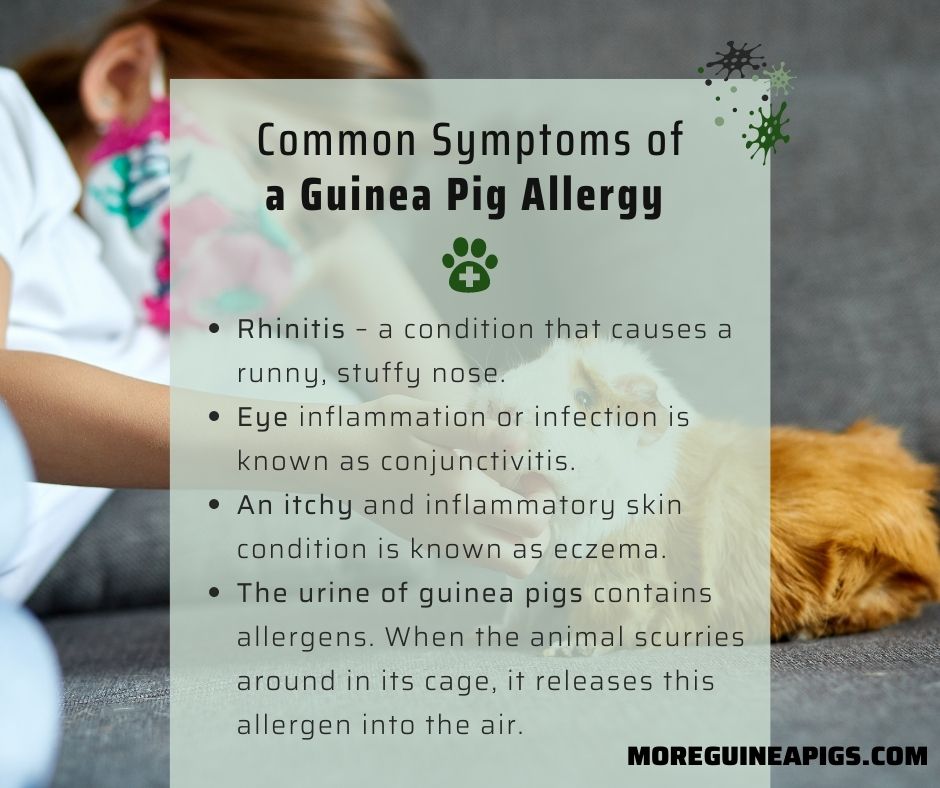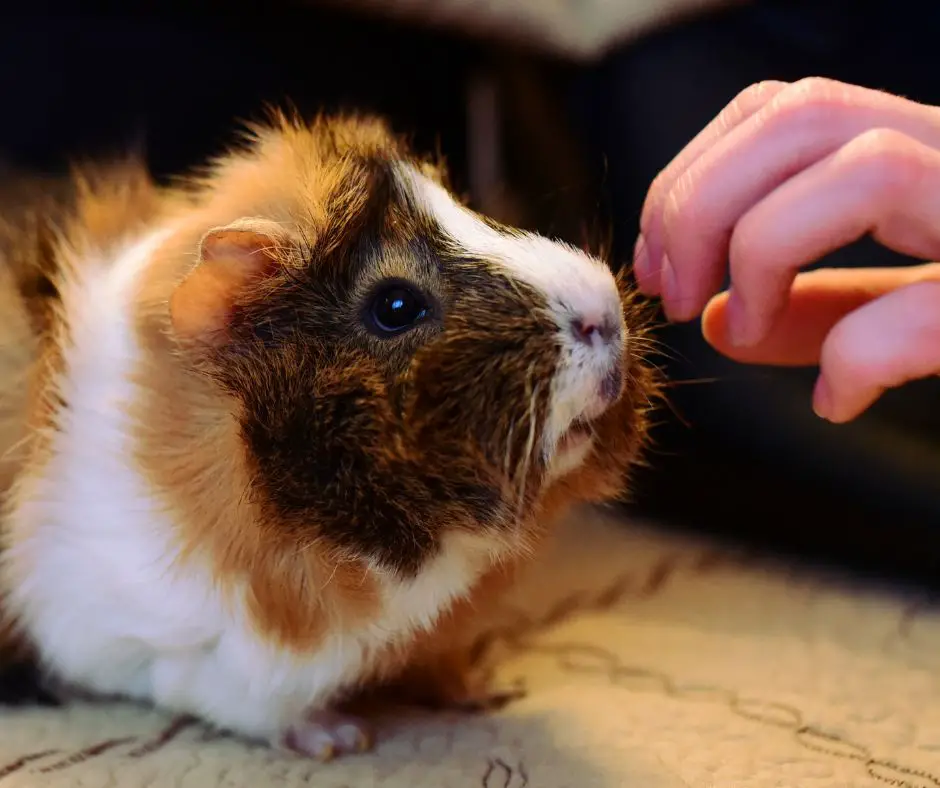Can You Be Allergic To Guinea Pigs?
You probably came to this article since you’ve either been sneezing a lot or having a runny nose and teary eyes ever since you got a guinea pig. Think you might have an allergy to them? Then you’ve come to the right place!
We’re going to talk about if guinea pigs can trigger allergies and how to reduce them and many more, let’s get the ball rolling before you sneeze or you’re doing your homework about guinea pigs before you get one.
Can You Be Allergic To Guinea Pigs?
Yes, guinea pigs can cause an allergic reaction in some people. Proteins found in the saliva and urine of animals trigger these allergies. Cav p I and Cav p II are two of the most common guinea pig allergies, respectively.
It was found that the most active extracts were those from guinea pig dust and dander as well as the urine and saliva of individual animals.
Common Symptoms of a Guinea Pig Allergy

You may experience a rash on your skin as well as anaphylactic shock, which is marked by itchy eyes, sneezing, and a runny nose (a true medical emergency).
Allergies can cause a variety of symptoms, including:
Respiratory reactions that cause trouble in breathing.
● Rhinitis – a condition that causes a runny, stuffy nose.
● Eye inflammation or infection is known as conjunctivitis.
● An itchy and inflammatory skin condition is known as eczema.
● The urine of guinea pigs contains allergens. When the animal scurries around in its cage, it releases this allergen into the air.
Cat allergies and guinea pigs aren’t the same. While it is possible to be allergic to multiple animal species, one cannot predict that a person will be allergic to a particular species simply because one is sensitive to another, completely different species.
Many people who are allergic to cats are actually allergic to their saliva, which is all over their hair due to cats grooming themselves on a daily basis. Guinea pigs groom as well, but not as thoroughly as cats.
They eat an entirely different diet than cats do, and their dander contains proteins that cats do not.
Before adopting a guinea pig permanently, try if you can borrow one for a week or so to evaluate your system’s response as you may be allergic to the bedding, hay, or other consumables containing the protein that guinea pigs secret.
Many people wonder if I’m allergic to cats will I be allergic to guinea pigs? It depends. Yes, Guinea pig allergies are probable if you’re allergic to cats. Even if a person is allergic to cats, they may not be allergic to guinea pigs.
In terms of protein structure, they are, however, very similar. Allergic to one kind of furry mammal? You’re probably allergic to most others.
How to Treat Guinea Pig Allergies
It depends on the person being affected by the allergy. If the person is already allergic to certain animals, especially non-hypoallergenic ones, then the effects can be severe and dangerous. However, this is rare.
The treatments to Guinea Pig allergies include:
● Antihistamines – Antihistamines reduce allergy symptoms quickly. One or two days will cure your reaction. Some people find relief by taking an allergy medication just after caressing a guinea pig, avoiding the unpleasant side effects. Your allergist should prescribe an antihistamine.
● Taking decongestants – Some guinea pig allergic persons complain of a plugged nose or difficulty breathing.
Then taking a decongestant after handling your guinea pig will help significantly. Decongestants are over-the-counter medications, thus no prescription is required.
You can also use a nasal decongestant with an antihistamine for a stronger impact. However, it is best to consult a doctor first. Get a prescription if you have high blood pressure, prostatic enlargement, or heart disease.
5 Ways to Reduce Guinea Pig Allergies
It is not the hair of guinea pigs that creates allergies. Instead, allergic parents would most likely react to their pig’s saliva, urine, and even dust or pollen particles in the wood shavings or hay.
The following are the five most important methods for reducing Guinea Pig allergies:
● Keep your guinea pig out of your bedroom
● Use a HEPA air purifier
● Limit direct contact as much as possible
● Take medication or immunotherapy
● Find a new home for your guinea pig.

Do Not Keep Your Guinea Pig In Your Bedroom
Keep your guinea pigs away from areas where you frequent. Take your pet out of the bedroom. One usually spends between a third and half of your time there. Keep the bedroom door closed and thoroughly clean the room.
Generally, people are allergic to the hay or bedding obtained from guinea pigs. Therefore, if you are one of those people who may be allergic to such things, keeping your guinea pigs in a different room may be a prudent choice.
Additionally, if you have a family history of respiratory problems or asthma, you might consider keeping your guinea pigs away from your sleeping area.
Use HEPA Air Purifier
Purchase a real HEPA air purifier and place it just next to the pig’s cage. Guinea pig allergies can remain in the air for an extended period of time, which the purifier will assist with.
If you leave it on 24 hours a day, it can assist in removing allergens from the air.
Air purifiers are capable of removing a wide variety of odors, even those found in cages. Not only do air purifiers eliminate odors, but they can also remove dust from hay.
LEVOIT Air Purifier for Home Allergies Pets Hair in Bedroom
Limit Direct Contact As Much As Possible
Avoiding direct touch with the guinea pig as much as possible is critical for allergy reduction. Given that saliva is one of the Guinea pigs’ primary allergens and that they groom themselves with spit, touching them will result in severe allergic reactions.
Apply a topical antihistamine to your skin prior to handling your Piggy. Support your pig with a couple of large towels to avoid skin contact. When holding your piggie, keep them away from your face and, if possible, wear cotton gloves.
After holding your guinea pigs, carefully wash your hands and arms (and any other place that may have been touched).
When holding your guinea pig, wear a turtleneck. Your neck and face skin is more delicate and sensitive than the skin on your hands and arms. As a result, an allergic reaction is more likely to occur there.
Maintain a safe distance between them and your face and neck. When holding your guinea pig, use a mask. Finally, have a family member who is not allergic clean the cage.

Take Medication or Immunotherapy
Take allergy injections. You CAN obtain guinea pig shots to aid with the sensitivity, but it is not recommended. It’s time-consuming and may not be 100% effective, but it can still be useful!
Do what your allergist has advised if you need to alleviate your symptoms using antihistamines, decongestants, inhalers, or asthma drugs.
Another way is that you can also”teach” your body’s immune system to not be sensitive to an allergen. Allergy injections are used to administer immunotherapy.
An animal protein that triggers an allergic reaction can be introduced into your system through one to two weekly injections. Over the course of four to six months, the dosage is gradually increased.
For the first three to five years, you’ll need to have a booster shot every four weeks. The use of immunotherapy is often reserved for situations in which less invasive approaches have failed.
Amazon Basic Care All Day Allergy, Cetirizine Hydrochloride Tablets
Find Your Guinea Pig A New Home
Nothing you do will always be able to protect you from the allergic responses that can occur when you pet a guinea pig.
In the event that you have tried immunotherapy and followed all of the precautions we have discussed here, and nothing has worked, it may be time to consider finding your furry buddy a new place to live.
While allergic reactions are usually not life-threatening at the time they occur, they can lead to more significant problems in the long run, such as asthma and anaphylactic shock, if the immune system is overworked.
Are Guinea Pigs Hypoallergenic?
This is not the case. A hypoallergenic guinea pig does not exist. Guinea pig allergies are extremely common. Although, unlike with certain animals, dander is not the primary source of irritation.
Rather than that, their saliva and urine contain allergens that are more irritating to certain persons than others. Even hairless guinea pigs can elicit allergic reactions since they groom and urinate.
As the pee dries, it can contaminate the air, making even living in the same house as a guinea pig you’ve never handled difficult.
Also read: Are Guinea Pigs Hypoallergenic?
In Short
So all in all, yes you can be allergic to guinea pigs, but it does not mean you should not get them or love them, there are many ways to reduce allergy reactions. But if it gets worse, consider having a checkup first from a doctor.
We hope that the information you found on this article is helpful and be careful when you’re out in the market looking for pets, you might not be allergic to guinea pigs but to something else!








